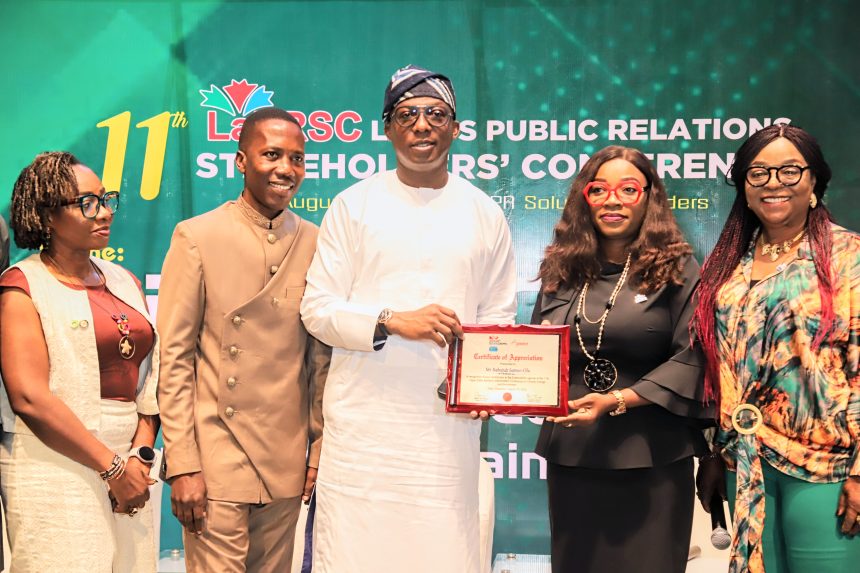The Lagos State governor, Mr. Babajide Sanwo-Olu, on Thursday urged all residents to support government efforts by becoming agents of change to achieve a clean, safe and sustainable environment.
The governor, who spoke through the Commissioner for the Environment and Water Resources, Mr. Tokunbo Wahab, at the 11th Lagos chapter of Nigerian Institute of Public Relations Stakeholders Conference held at the Muson Centre Onikan Lagos, added that it had become imperative for everyone to have a renewed sense of purpose, commitment and endeavour to secure a sustainable future for generations to come.
According to him, “we must be bold in our commitment and relentless effort in our pursuit of solutions; the stakes are too high for half measures; let us not underestimate the power of collective action – when we work together, we can achieve what may seem impossible”.
Highlighting the theme of the event “Stakeholders Conversation On Climate Change And Environment: Communication And The Sustainability Agenda,” Sanwo-Olu said the time is now for all to take actionable steps towards a future that all can be proud of.
He said the reality of climate change is here, and its impacts are felt across the globe, saying Lagos was witnessing her share of the devastating impacts while the government continued to take urgent action so that the events would not become more frequent and severe.
He explained that Lagos vulnerability was heightened by its dense population and coastal positioning – exposing it to risks such as rising sea levels, extreme weather events, and heatwaves as such the hazards posed substantial threats to the livelihoods, infrastructure of its urban populace, particularly affecting the less affluent and most vulnerable segments of the population.
He added that climate change posed significant challenges and opportunities for economics, finance, and development, saying the government had recognized that inaction against the impacts of Climate Change would affect the environment and people’s wellbeing.
He said the government had instituted several adaptation programmes to ensure that women, children and all other vulnerable groups were shielded from the effects of Climate Change.
He recalled that in June this year at the 10th Lagos International Climate Change Summit, the Ministry of the Environment and Water Resources launched the Lagos Climate Adaptation and Resilience Plan, LCARP, which is designed to complement and build upon these high-level plans by utilizing advanced analytics for robust risk and impact assessment.
Wahab stated that the present administration had developed high-level plans and roadmaps focusing on climate action and that included the Lagos Climate Action Plan, Lagos State Climate Risk Assessment, and the Lagos Resilient Strategy.
He stressed that the documents highlighted adaptation goals and programmes, present high-level climate risk mapping, attempt to detail the impacts and actions required.
He said it set a clear adaptation and resilience (A&R) ambition that was translated into projects, developing a funding strategy and ensuring strengthened stakeholder engagement.
READ ALSO: Cuban president awards Soyinka national medal of honour
He stated further that the public and private sectors in Lagos must adopt the Lagos Climate Adaptation and Resilience Plan, LCARP, with the aim of incorporating plan, programme and actions that would set Lagos on a pathway for carbon neutrality and increased adaptation for her populace.
He said the Climate action and sustainability had to be integrated at the heart of growth strategies, investment plans and institutional structures to facilitate the flow of public and private finance.
He said communication and sustainability agenda was critical more than ever as Communication was not just a tool but was the foundation upon which a sustainable future could be built.
He added that communication was the lifeblood of any society, saying that it shapened the perceptions, drives the decisions, and connects everyone across geographical, cultural and social divides.
“As a government, we are bound by the pact we made with Lagosians not only to serve them diligently but also to be transparent about our sustainability efforts,” he said.
He emphasized that Lagos as a frontline state continually strove for improvement as such at the start of the second term conducted a thorough review of the T.H.E.M.E.S Agenda to enhance its inclusivity.
He added that the blue line spans 27 km from Okokomaiko to Marina, while the red line covers 37 km from Agbado to Marina saying the complete transit system would eventually include six lines, with the green line (68 km) and purple line (60 km) also underway.
He stressed that the rail projects were crucial for reducing carbon footprint, decreasing vehicular emissions, cutting down travel time, and promoting a sustainable, low-carbon future for Lagos.
He emphasized that Lagos being the city of aquatic splendour was maximizing the blue economy by attracting an investment worth €410 million for the Omi Eko water transport project added that soon the waterways would be dotted by electric-driven ferries.
He said the government would be building a lot more terminals and jetties thereby reducing travel times, opening more semi and peri-urban cities to urbanization and cutting down on the emission.
He said the state was also dedicated to enhancing the energy sector through the Off-grid Electrification Strategy and Action Plan.
He added that the goal was to achieve 1 gigawatt (GW) of solar photovoltaic generation by 2030.
He stressed that the initiative would revolutionize the city’s power landscape, paving the way for a brighter and more sustainable future, saying the ambitious target would not only reduce reliance on expensive diesel generators but also usher in a new era of clean energy.
He emphasized the urgent need for increase investment in green technology and the empowerment of the youths and communities in general to take active roles in climate action and sustainability efforts saying everyone must leverage the data and technology at their disposal to make informed decisions.
He said the aforementioned could be achieved by addressing all the challenges and seizing opportunities, Lagos State could make significant strides towards sustainable and resilient future.














